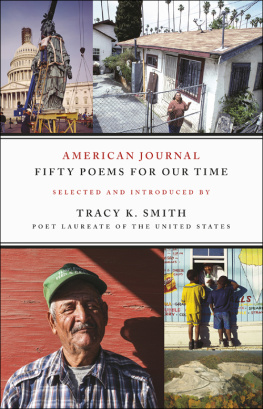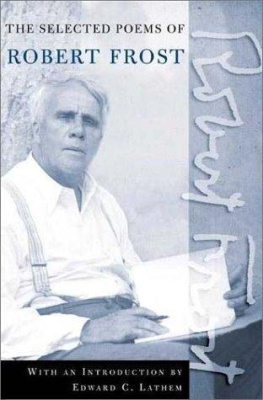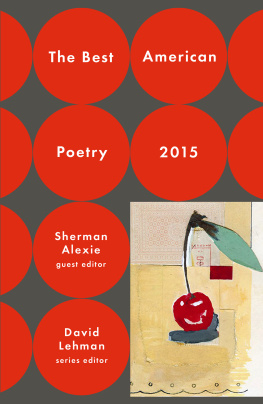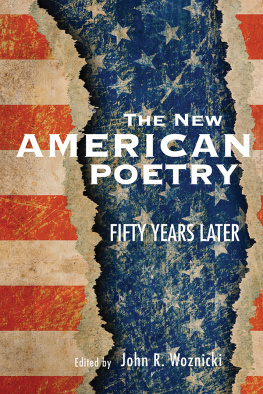Note to the Reader on Text Size in the street of money in the city of money in the country of money, We recommend that you adjust your device settings so that all of the above text fits on one line; this will ensure that the lines match the authors intent. If you view the text at a larger than optimal type size, some line breaks will be inserted by the device. If this occurs, the turn of the line will be marked with a small indent.
AMERICAN JOURNAL

BOOKS BY TRACY K. SMITH Poetry The Bodys Question Duende Life on Mars Wade in the Water Memoir Ordinary Light

AMERICAN JOURNAL
FIFTY POEMS FOR OUR TIME
SELECTED AND WITH AN INTRODUCTION BY
TRACY K. SMITH

GRAYWOLF PRESS IN ASSOCIATION WITH THE LIBRARY OF CONGRESS Permission acknowledgments appear on pages .
The author and Graywolf Press have provided this e-book to you for your personal use only. You may not make this e-book publicly available in any way. Copyright infringement is against the law. If you believe the copy of this e-book you are reading infringes on the authors copyright, please notify Graywolf Press at: us.macmillanusa.com/piracy. This publication is made possible, in part, by the voters of Minnesota through a Minnesota State Arts Board Operating Support grant, thanks to a legislative appropriation from the arts and cultural heritage fund, and a grant from the Wells Fargo Foundation. Significant support has also been provided by Target, the McKnight Foundation, the Lannan Foundation, the Amazon Literary Partnership, and other generous contributions from foundations, corporations, and individuals.
To these organizations and individuals we offer our heartfelt thanks.  Published by Graywolf Press, in association with the Library of Congress 250 Third Avenue North, Suite 600 Minneapolis, Minnesota 55401 All rights reserved. www.graywolfpress.org Published in the United States of America Printed in Canada ISBN 978-1-55597-838-9 (cloth) ISBN 978-1-55597-815-0 (paper) ISBN 978-1-55597-867-9 (ebook) 2 4 6 8 9 7 5 3 1 First Graywolf Printing, 2018 Library of Congress Control Number: 2018934515 (cloth), 2018934515 (paper) Cover design: Kyle G. Hunter Cover art: Upper left: In 1993, Thomas Crawfords Statue of Freedom was removed by helicopter from the U.S. Capitol dome for restoration. , by Carol Highsmith, 1993. Carol M. Carol M.
Published by Graywolf Press, in association with the Library of Congress 250 Third Avenue North, Suite 600 Minneapolis, Minnesota 55401 All rights reserved. www.graywolfpress.org Published in the United States of America Printed in Canada ISBN 978-1-55597-838-9 (cloth) ISBN 978-1-55597-815-0 (paper) ISBN 978-1-55597-867-9 (ebook) 2 4 6 8 9 7 5 3 1 First Graywolf Printing, 2018 Library of Congress Control Number: 2018934515 (cloth), 2018934515 (paper) Cover design: Kyle G. Hunter Cover art: Upper left: In 1993, Thomas Crawfords Statue of Freedom was removed by helicopter from the U.S. Capitol dome for restoration. , by Carol Highsmith, 1993. Carol M. Carol M.
Highsmith Archive, Library of Congress, Prints and Photographs Division, LC-DIG-highsm-13969. Upper right: Maria Gomez, 3466 2nd Ave., LA , by Camilo Jos Vergara, 2003. Library of Congress, Prints & Photographs Division, LC-DIG-vrg-00309. Lower left: Richard Ortiz is a migrant worker in Nipomo, California, where famous photographer Dorothea Lange took a photograph of the Migrant Mother, Florence Owens Thompson in the 1930s , by Carol Highsmith, 2013. The Jon B. Lovelace Collection of California Photographs in Carol M.
Highsmiths America Project, Library of Congress, Prints and Photographs Division, LC-DIG-highsm-25212. Lower right (top): Sno-cone stand, New Orleans, Louisiana , by Carol Highsmith, between 1980 and 2006. Carol M. Highsmith Archive, Library of Congress, Prints and Photographs Division, LC-DIG-highsm-13991. Lower right (bottom): Aerial view of mountaintop removal, approaching Racine , by Lyntha Scott Eiler, 1995.
AMERICAN JOURNAL
INTRODUCTION: THIS IS WHY

This is why I love poems: they invite me to sit down and listen to a voice speaking thoughtfully and passionately about what it feels like to be alive.
AMERICAN JOURNAL
INTRODUCTION: THIS IS WHY

This is why I love poems: they invite me to sit down and listen to a voice speaking thoughtfully and passionately about what it feels like to be alive.
Usually the someone doing the talkingthe poems speakeris a person Id never get the chance to meet were it not for the poem. Because the distance between us is too great. Or because we are too unlike one another to ever feel this at ease face-to-face. Or maybe because the person talking to me never actually existed as anything other than a figment of a poets imagination, a character invented for reasons I may not ever know. Even when that someone is the real-life poet speaking of things that have actually happened, there is something differentsome new strength, vulnerability, or authoritythat the poem fosters. This is why I love poems: they require me to sit still, listen deeply, and imagine putting myself in someone elses unfamiliar shoes.
The world I return to when the poem is over seems fuller and more comprehensible as a result. American Journal: Fifty Poems for Our Time is an offering for people who love poems the way I do. It is also an offering for those who love them in different ways, and those who dont yet know what their relationship with poetry will be. I hope there is even something here to please readers who, for whatever the reason, might feel themselves to be at odds with poetry. These fifty poemsculled from living American poets of different ages, backgrounds, and aesthetic approaches, and with different views of what it feels like to be alivewelcome you to listen and be surprised, amused, consoled. These poems invite you to remember something you once knew, to see something youve never seen, and to range from one set of concerns to another.
For the time that you are reading them, and even after, these poems will collapse the distance between you and fifty different real or imagined people with fifty different outlooks on the human condition. But how? How do poems capture the significant yet hard-to-describe events and feelings punctuating our lives, and our time? Poems call upon sounds and silence to operate like music. They invoke vivid sensory images to make abstract feelings like love or anger or doubt feel solid and unmistakable. Like movies, poems slow time down or speed it up; they cross cut from one viewpoint to another as a way of discerning connections between unlikely things; they use line and stanza breaks to create suspense. Even the visual layout of words on the page is a device to help conduct a readers movement through the encounter that is the poem. These and other tools help poems call our attention to moments when the ordinary nature of experience changeswhen the things we think we know flare into brighter colors, starker contrasts, strange and intoxicating possibilities.
Theres something else these fifty poems are up to. As the title American Journal suggests, they are contemplating what it feels like to live, work, love, strive, raise a family, and survive many kinds of loss in this vast and varied nation. The great poet Robert Hayden, from Detroit, Michigan, was the first African American to serve in the role now known as Poet Laureate of the United States. His final collection contains an extraordinary poem called [American Journal], which is written in the voice of an alien from outer space sent to earth to observe humankind. On this planet, the speaker finds himself most drawn to the americans, whom he calls this baffling multi people. He recognizes America as a land of contrasts and contradictions, a place still new, still reckoning with the implications of its history.

















 BOOKS BY TRACY K. SMITH Poetry The Bodys Question Duende Life on Mars Wade in the Water Memoir Ordinary Light
BOOKS BY TRACY K. SMITH Poetry The Bodys Question Duende Life on Mars Wade in the Water Memoir Ordinary Light 
 Published by Graywolf Press, in association with the Library of Congress 250 Third Avenue North, Suite 600 Minneapolis, Minnesota 55401 All rights reserved. www.graywolfpress.org Published in the United States of America Printed in Canada ISBN 978-1-55597-838-9 (cloth) ISBN 978-1-55597-815-0 (paper) ISBN 978-1-55597-867-9 (ebook) 2 4 6 8 9 7 5 3 1 First Graywolf Printing, 2018 Library of Congress Control Number: 2018934515 (cloth), 2018934515 (paper) Cover design: Kyle G. Hunter Cover art: Upper left: In 1993, Thomas Crawfords Statue of Freedom was removed by helicopter from the U.S. Capitol dome for restoration. , by Carol Highsmith, 1993. Carol M. Carol M.
Published by Graywolf Press, in association with the Library of Congress 250 Third Avenue North, Suite 600 Minneapolis, Minnesota 55401 All rights reserved. www.graywolfpress.org Published in the United States of America Printed in Canada ISBN 978-1-55597-838-9 (cloth) ISBN 978-1-55597-815-0 (paper) ISBN 978-1-55597-867-9 (ebook) 2 4 6 8 9 7 5 3 1 First Graywolf Printing, 2018 Library of Congress Control Number: 2018934515 (cloth), 2018934515 (paper) Cover design: Kyle G. Hunter Cover art: Upper left: In 1993, Thomas Crawfords Statue of Freedom was removed by helicopter from the U.S. Capitol dome for restoration. , by Carol Highsmith, 1993. Carol M. Carol M. This is why I love poems: they invite me to sit down and listen to a voice speaking thoughtfully and passionately about what it feels like to be alive.
This is why I love poems: they invite me to sit down and listen to a voice speaking thoughtfully and passionately about what it feels like to be alive.